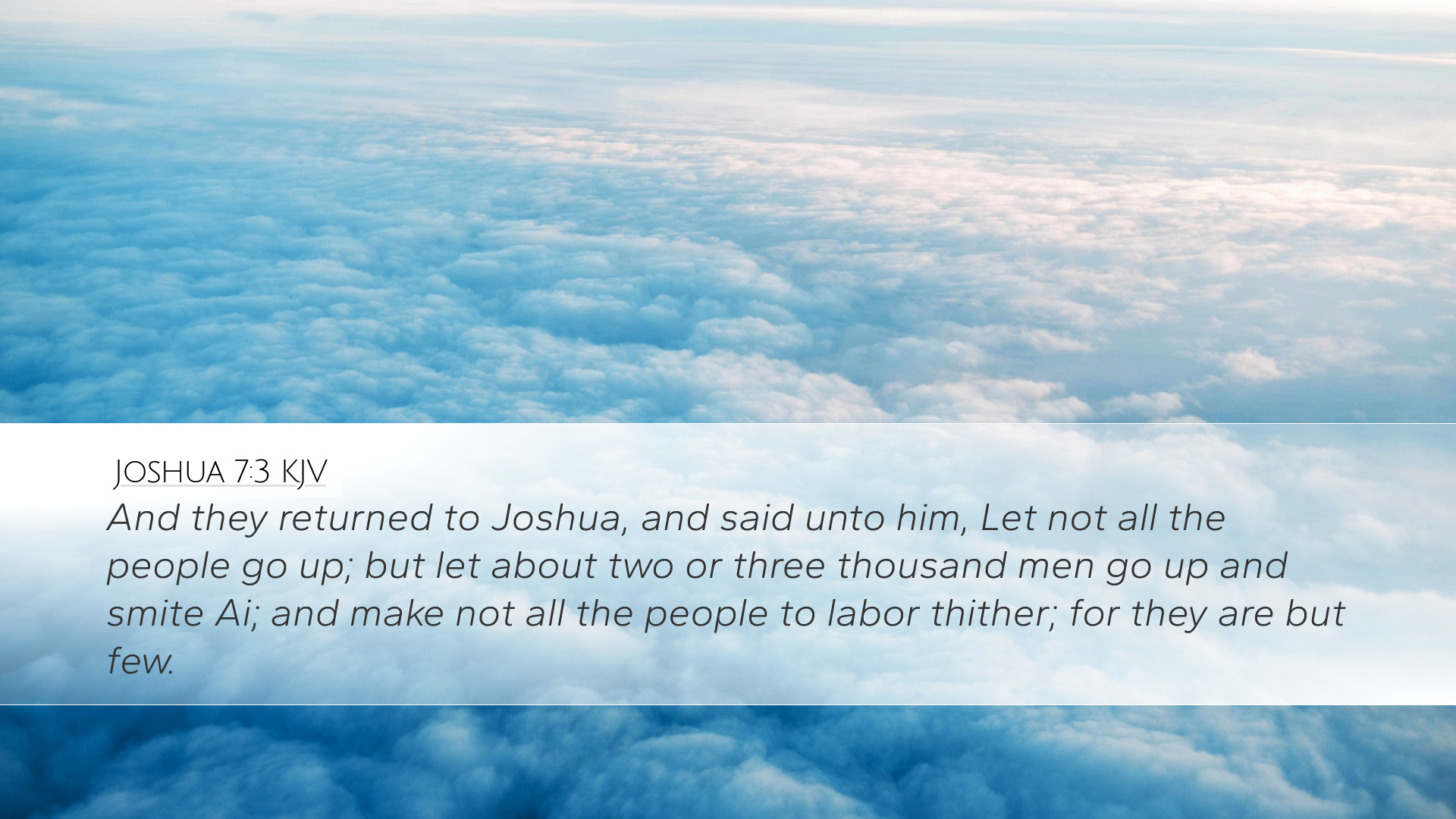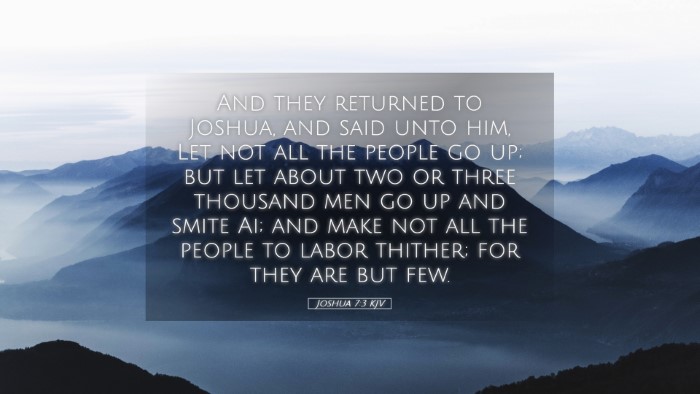Commentary on Joshua 7:3
The verse Joshua 7:3 states: "And they returned to Joshua, and said unto him, Let not all the people go up; but let about two or three thousand men go up and smite Ai; and make not all the people to labor thither; for they are but few."
Introduction
The account in Joshua 7:3 is pivotal within the narrative of the conquest of Canaan. It reveals the dynamics of leadership, the dangers of presumption, and the spiritual state of Israel at this crucial juncture. This commentary synthesizes insights from renowned public domain commentators including Matthew Henry, Albert Barnes, and Adam Clarke.
Analysis of the Verse
In this verse, the spies sent by Joshua returned with a report regarding the city of Ai. Their suggestion to send only a small contingent of soldiers illustrates their confidence and perhaps an underestimation of their enemy.
Confidence in Human Strength
Matthew Henry emphasizes that the spies’ report is marked by an overconfidence that often accompanies success. Previously, Israel's victory over Jericho led them to presume that a similarly effortless victory was achievable at Ai. Such presumption can lead to spiritual complacency, an important lesson for leaders and congregants alike.
Spiritual Implications
Albert Barnes comments on the spiritual implications of this decision. He notes that this moment reflects the larger issue of Israel's reliance on God versus their own strength. The suggestion to send only a few thousand men indicates a lack of prayerful consideration and dependence on divine guidance, a theme that resonates with many biblical narratives.
The Role of Community
Adam Clarke brings attention to the communal aspect of Israel’s military strategy. The decision to not send all the people reflects not only a tactical military decision but also reveals a growing sense of individualism within the Israelite community. Clarke warns that ignoring the strength of community and collective counsel can lead to disastrous outcomes.
The Context of the Conquest
Understanding Joshua 7:3 also requires contextual analysis within the broader narrative of the conquest of Canaan. This verse demonstrates a critical moment before a significant failure that Israel would endure.
Prelude to Defeat
Matthew Henry notes that this presumption laid the groundwork for Israel's forthcoming defeat at Ai. This moment serves as a precursor to the eventual revelation of sin within the camp, specifically the sin of Achan, which invited divine judgment. It underscores the principle that unchecked pride often precedes downfall.
Lessons on Leadership
The directives and decisions made by leaders are vital in the faith journey of communities. Albert Barnes asserts that Joshua's leadership is challenged here, as he must grapple with the results of this presumption. When leaders act based on incomplete information or insufficient grounding in prayer, it can lead to erratic consequences.
Faith and Warfare
Warfare in the biblical narrative often manifests both physical and spiritual dimensions. The events surrounding Joshua 7:3 remind readers that conflict requires divine wisdom along with bold action.
Dependence on God
Adam Clarke stresses the importance of seeking God's will in every action before proceeding. The spurious assumption that Ai could fall easily reflects a general neglect of prayer and reliance upon God’s guidance. It emphasizes a critical lesson: every battle, spiritual or physical, must begin and end with God.
Reflection on Modern Leadership and Strategy
The cautionary tale embedded in Joshua 7:3 possesses contemporary relevance for modern leaders in the church and broader faith community. Today’s leaders should reflect on the necessity of surrendering plans to God and ensuring that actions are undergirded by prayer, reflection, and communal discernment.
Concluding Thoughts
Joshua 7:3 serves as a compelling reminder of the pitfalls of human confidence over spiritual dependence. Through insights drawn from esteemed commentaries, we see the profound implications this verse has for faith, leadership, and communal discernment.
Scholars, pastors, and students alike are encouraged to meditate on this passage, contemplating how reliance on God shapes their paths and decision-making processes in the face of challenges.
In conclusion, the commentary on Joshua 7:3 not only provides an analysis of a specific historical moment but also encourages ongoing reflection on the connection between faith in God and the actions of His people. It invites a deeper understanding of how reliance on divine guidance is paramount in all endeavors.


